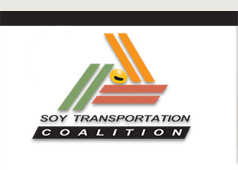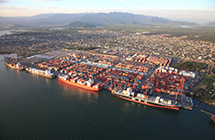 |
 |
|
| eNews • October 2018 | ||
| Promoting a Cost-Effective, Reliable and Competitive Transportation System |
||
 Santos shippers want port management change to cut inefficiency
Santos shippers want port management change to cut inefficiency
Santos, South America's biggest container shipping port, should have Brasilia's management authority taken away and given to Santos City Hall or the São Paulo state government - something that would slash costs and reduce bureaucracy, so said Luiz Otavio Campos, national secretary of Brazilian Ports, speaking at the recent Santos Export Conference in the port city.
Shippers and ocean carriers using Santos have been remonstrating for years about the politicization and the time-consuming bureaucracy of the port authority for Santos (Companhia Docas do Estado do São Paulo: Codesp). Many argue "regionalization" might help solve problems, including a lack of dredging to issues such as improved/expanded infrastructure. At the conference, Santos Mayor Paulo Alexandre Barbosa made a formal request for regionalization of Santos; that was supported by Geraldo Alckmin, the former governor of São Paulo state, who stepped down in April to run for Brazil's presidency.
"We are referring this request [for regionalization] to our technical department," said Campos. "But I am sure that I will return here by the end of the year to give the green light to the management of the port of Santos to transfer powers to either the state government of São Paulo or to City Hall. This will streamline not only port investments, but we will also be able to overcome the many bureaucratic barriers that we have."
In recent weeks Brazil's most powerful shippers' group, the Federation of Industries for the state of São Paulo (Fiesp), and its fellow lobbying group the Center for São Paulo State Industries (Centro das Industrias do Estado de São Paulo: Ciesp), have also stepped up their campaigns to persuade the government of President Michel Temer to speed up the process of regionalization.
Both bodies see it as the best way to boost the export capacities of its key shippers; those include chicken and beef exporters, such as Brasil Foods SA and JBS SA, the largest meatpacker in the world, as well as auto parts and car manufacturers.
With more than 40 percent of Brazil's containers handled by Santos, as well as 30 to 33 percent its of trade, plus a hinterland that includes the state of Paraná, and 60 percent of Brazil's GDP, an efficient Santos is crucial to the success of companies affiliated to Fiesp and also the Confederation of National Industries of Brazil.
Perfect storm for increased Brazil exports
José Ricardo Roriz Coelho, the acting president of Fiesp and Ciesp, attended both the Fiesp and Santos Export events and emphasized that the weak real - the real has weakened from 3.1 to the US dollar a year ago to more than 4.1 to the dollar today - and China/US trade tension have created export opportunities for state of São Paulo industries. However, Fiesp members cannot make the most of these opportunities, argues Coelho, due to the port's logistics inefficiencies, hence regionalization should be given a chance.
"We are increasing our exports all the time and are about to embark on a mission to China with 300 companies," Coelho said. "Our goal is to add more and more value to Brazilian exports, but the inefficiencies at our main port, Santos, are one of the main obstacles to this, so we need to change this."
One inefficiency example is dredging. Centronave, which represents all foreign-flag container carriers in Brazil, states that Santos could handle an extra 500,000 containers per year if dredging inefficiency ended, which would boost productivity by all transport users.
If the regionalization plan - which Campos said could feasibly be implemented by the end of 2018 - were to go ahead, it would, for Campos, be a bit like a turkey voting for Christmas, as he would lose much of the jurisdiction of his current job, as he heads up the ports' section of the Ministry of Transport, Ports and Civil Aviation.
Campos said he would still have sway over several other ports - including Rio de Janeiro, Salvador, and Fortaleza - but losing Santos from the portfolio would be a massive loss of power, prestige, and political patronage.
Political patronage has been one of the main bugbears for Santos port users and shippers, as the ruling parties in Brasilia have used the Codesp board to award their political supporters with sinecures, which leads to benefits for the various parties in any government coalition. There are two other problems with this system. First, the politicos appointed are often from outside Santos and lack knowledge of the port city and the technical aspects of port management and operations. Fiesp and other critics want more local managers and "more technicos."
Second, with the final decision-makers located in Brasilia, there are long delays for even the simplest decision. Claudiomiro Machado, the president of the Santos Dockworkers Union, who attended the Fiesp seminar, summed up the general feeling when he quipped, "Today, to solve a paper clip shortage in Santos, you have to catch a plane and go to Brasilia. This has to stop."
Two other ports
Two container-orientated ports with successful local management are Itajai, where the City Hall administers the operation, and Paranaguá, where the state government of Paraná is in charge. These two are Brazil's number two and three container shipping ports, respectively.
Interestingly, privatization of Codesp was not mentioned during the two seminars and that suggests lobbyists seem to be focusing first on regionalization, with privatization of port management to follow, depending on who wins Brazil's presidential election in October. Also, there was no clear preference as to which of the two local options - the state of São Paulo or the city of Santos - should be granted the devolved powers; some influential professionals are recommending that a mixture of both should manage the port.
Mark Juzwiak, head of institutional affairs for Aliança Navegação e Logistica Ltda and Hamburg Sud, has been a board member of the commercial association for Santos (Associacão Commercial de Santos) for some years now, and he has no doubt that regionalization would herald a big improvement in port of Santos management, which handled 3.85 million TEU in 2017.
"I have always been in favor of regionalization of the Dock companies [Companhoas Docas] so that the local business community and shippers can have a stronger say," Juzwiak said. "In the case of Codesp, the control in my opinion should be given to Santos with participation of the state of São Paulo. After all, Santos is the main port of the state of São Paulo. The interference of Brasilia in local matters has always resulted in a strong opposition from the local business community and especially Codesp staff, which has often led to conflicts.
"I have also seen regionalization working very well in the port of Itajai, for example, where there is a strong involvement of the local business community not only from the city of Itajai but also all the cities in the hinterland, which benefit from an efficient port in the region," Juzwiak said. Although Itajai has had setbacks when the federal government took control of the port [during a period of serious flooding] it has performed miracles considering its physical characteristics and competition from the other nearby ports and terminals."
Joao Emilio Freire Filho, a consultant for Rio de Janeiro-based MA Consultoria e Eventos Ltda, has worked closely with the port of Santos authority for decades, both for the private sector and public sector, and he argues that privatization would work best, but if not, then the port in the hands of the state government - not the city of Santos - would be next best.
"For 90 years, up until 1981, the management of the port of Santos had been in private hands, in the hands of a family business, but since then the politicos have taken over and made it a basket case," said Freire, who worked for Portobras in the 1970s. During that time, while working for a consultancy, he composed several 10-year plans for the government agency. "I would prefer to see it privatized again because you might replace one set of inefficient politicos with another set. I also think that the City Hall [city of Santos] might be a little too close to what is happening on the ground, and that could lead to conflicts of interest. Therefore, for me, regionalization in the hands of the state of São Paulo would be next best after the privatization option."
Juzwiak seconded Freire.
"Privatization of the port authority is a possibility which, if well implemented, could bring benefits, no doubt. In my view the less the government gets involved the better," Freire added.
Source: Joc.com
Soy Transportation Coalition |
|
